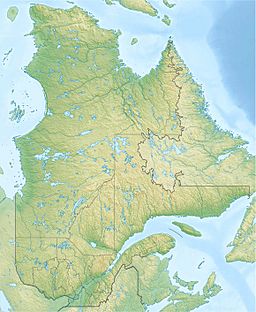Musquaro Lake facts for kids
Quick facts for kids Lake Musquaro |
|
|---|---|
| Location | North America |
| Group | Côte-Nord |
| Coordinates | 50°35′48″N 60°59′43″W / 50.596733°N 60.995336°W |
| Primary inflows | Musquaro River |
| Primary outflows | Musquaro River |
| Max. length | 43 km (27 mi) |
| Max. width | 8 km (5.0 mi) |
| Surface area | 207 km2 (80 sq mi) |
| Settlements | Kegaska, Quebec |
The Musquaro Lake is a large and important lake in Quebec, Canada. It is found in a wild, unorganized area called Petit-Mécatina, Quebec. This region is part of the Côte-Nord (North-Shore) administrative area. The lake is a major part of the Musquaro River system.
Contents
Where is Lake Musquaro?
Musquaro Lake is located on the Côte-Nord (North Shore) of the Gulf of Saint Lawrence. It covers a huge area of 207 square kilometers (about 80 square miles). The lake is quite long, stretching 43 kilometers (27 miles), and is 8 kilometers (5 miles) wide. It's actually a big, wide part of the Musquaro River itself.
Lake Musquaro's Location Details
This lake is the main source of water for the Musquaro River. The river flows out from a bay at the south end of the lake. This spot is about 32.5 kilometers (20 miles) northeast of the village of Kégaska. Kégaska is right on the Gulf of Saint Lawrence.
Lake Musquaro has other lakes nearby. To its south is La Pommeraye Lake. To its west is Lake Marie Claire. It is also about 4 kilometers (2.5 miles) north of Lake Musquanousse. Lake Musquanousse flows into the Musquanousse River.
What Does Lake Musquaro Look Like?
Musquaro Lake has a very interesting and complex shape. It's not just a simple oval! The lake is filled with many islands of all shapes and sizes. It also has lots of peninsulas, which are pieces of land sticking out into the water. Many of the lake's bays are long and narrow. The lake gets its water from several rivers and other lakes. One of these is Lake D'Auteuil, which seems to be an extension of Musquaro Lake itself.
What's in a Name? The Story of Musquaro
The name "Musquaro" comes from a Native American language. It means "tail of a black bear." The Montagnais people, who are a First Nation group, call the lake "Mahkuanu Nipi," which means "lake of the black bear tail." They call parts of the river "Kapitahkuiat Hipu" or "Mahkuanu Hipu," meaning "black bear tail river."
The Bear Mountain Legend
A long time ago, a priest named Charles Arnaud wrote about the area. He mentioned that if you go up the Musquaro River, you'll find a mountain that looks exactly like a bear. He even said it looked so much like a bear that "not even the tail" was missing! This story helps explain the name.
How the Name Changed Over Time
The Naskapi people, another First Nation group, used the name "Maskuanu Shipis." This means "the little river of the black bear's tail." This name appeared in old documents from the 1600s, but with different spellings. For example, on a map from 1685, it was written as "Mascouarou."
Over the years, many different spellings were used for the river's name. Some of these included Muskwaro, Mascourao, Maskuaro, Masquaro, and Musquaro. Other spellings like Maskouaro and Musquarro were also seen. Even with these differences, the way people said the name was very similar. The name "Lake Musquaro" was officially recognized on December 5, 1968, by the Geographical Names Board of Canada.
Related articles
- Musquaro River
- Petit-Mécatina, Quebec, unorganized territory
- Le Golfe-du-Saint-Laurent Regional County Municipality,
- Côte-Nord, administrative region
- Kegaska, village of Côte-Nord (North-Shore)
- Gulf of Saint Lawrence
 | Kyle Baker |
 | Joseph Yoakum |
 | Laura Wheeler Waring |
 | Henry Ossawa Tanner |


